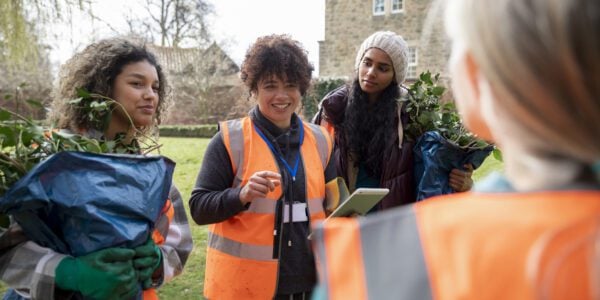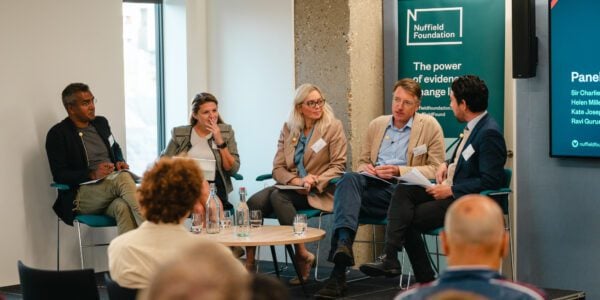New analysis from the Nuffield Foundation reveals that the influence of digital technology on Generation Z is more complex than measuring screen time. What they are doing online, why, and how it affects them, are far more important indicators of impact on their well-being.
Drawing on large-scale surveys, existing research, and insights from young people, findings from Growing up online highlight the diverse experiences, attitudes, and concerns young people have about their digital lives, underscoring the need for more nuanced approaches to policies guiding technology use.
As part of the Foundation’s Grown up? Journeys to adulthood programme, researchers looked at data on 14 to 24-year-olds. By focusing on this age group, findings provide new insight into Gen Z, most of whom have never known an offline world.
Alongside the data review, and working with independent social research agency Hopkins Van Mil, we commissioned independent qualitative research working with 50 young people from all four nations of the UK to consider how digital technology impacts their lives, providing a window into the reality behind the statistics. Comments from Born connected: How Gen Z navigate their digital lives are shared below.
The research identified key digital markers that now shape the journey through adolescence. These include receiving a smart phone at the transition between primary and secondary school, less adult oversight, and the rise of social media as a dominant force during secondary years.
Key themes and findings
The following themes emerged, painting a complex and sometimes conflicting picture of Gen Z and their interactions with technology.
Social media and online advertising are problematic
- Social media is deeply embedded in the lives of Gen Z. 99% of 16 to 24-year-olds use social media platforms, with Instagram, TikTok, and Snapchat leading the way
Joining social media was defined as a ‘milestone’ moment by one young person, often happening at the start of secondary school.
Young people told us that its addictive nature makes it hard to resist or escape, describing social media as a ‘double-edged sword’ where the positives of connection, entertainment, and convenience are sharply contrasted by negatives of regret, guilt, and lack of control.
We heard that online advertising on social media platforms was a contributing factor to body dysmorphia, eating disorders, and risk-taking with cosmetic procedures.
- Negative effects on body image are reported by 43% of 18–to 22-year-olds.
“Snapchat, Twitter, Instagram, Reddit. Twitter is the worst, it’s so unregulated. You just see the most horrific things you could think of. You do get exposed to that at a young age.”
The all-day digital life – Gen Z are online from dawn to dusk but are trying to take control
Nearly every 14-24-year-old in the UK owns or has access to a smartphone. But while the latest data tells us that on average, 13–18-year-olds report spending over 3.5 hours a day on phones, the reality is likely to be much higher. 38% of 13 to 17-year-olds feeling like they spend too much time on devices.
Young people in our workshops shared that their “digital life” starts from the moment they wake up, to lying in bed at night unable to sleep.
“It affects my sleeping pattern a lot. There’ll be times I just get so distracted, messaging friends and I go to sleep really late. When I can’t fall asleep, I’ll go on TikTok for a bit and then stay on it for ages.”
But speaking with young people tells us that time online is not all endless scrolling or exposure to harm and that they use devices to listen to music, study, watch films and tv, and gaming.
Young people also said that they attempt to control their screentime using a variety of methods including going screen-free when meeting with friends, using apps that impose fines, and learning to ‘manipulate’ the algorithms.
Relationships and family life
For many, social media is an important space for sustaining existing relationships as well as making new connections:
- 72% of 13-17 year-olds say using social media helps them feel closer to their friends
- 46% of 14-year-olds and 48% of 15-year-olds get together with friends online every day
- A quarter of 16 to 21-year-olds have a close friend they’ve never met in person
The young people in our workshops describe that their digital journey as younger children began with communal, family entertainment, often in shared spaces at home. But when they started secondary school, joined social media, and experienced a drop in parental supervision, online experiences shifted dramatically. They told us that building relationships in digital spaces can feel deeply unsafe and unregulated, citing fake profiles, creepy behaviour, extreme views, and inappropriate mixing of age groups, issues that are harder to detect online.
The impact of digital living on well-being
Cyberbullying affects nearly four in ten 11 to 25-year-olds, and 46% of 14 to 24-year-olds say that the addictive pull of social media has reduced their ability to focus. Nearly half (48%) of 14–22-year-olds report that after using social media they feel that other people’s lives are better than their own.
“whatever you put online, no matter how good it is, someone always has something bad to say.”
Young people keen to know about world events can feel overstimulated, impacted by a constant stream of negative online news, and under pressure to identify what is real, fake or false. Research shows that 81% of 18–24-year-olds have seen potentially AI-generated false or misleading information, and 65% have seen content that promotes violence, abuse or hate.
“It’s one of the first times in history that a war has been live streamed, with Ukraine and what’s going on in the Middle East. It’s really hard to escape. Especially when I was younger, I was desensitised pretty quickly.”
More positively, digital life can help expand connections, enrich real-world hobbies, and support their learning.
“AI has changed the way I revise. I’ve got ADD so I find it really hard to sit down and focus myself on revision. Formatting the information will take up all of my revision time, so now I can use AI to put it into a way that I understand.”
Where young people want action taken
Young people who took part in the research were keen to see action taken, including:
- Clear and consistent rules on in-school phone use
- Acknowledgement that young people feel a tension between their digital life and their well-being
- A push for more inter-generational learning on the benefits and harms of digital technologies and a call for adults to stay on top of digital developments
The contradictions of young people’s digital lives mean acknowledging the complexities, and being prepared to recognise that bans may not be the answer.
Our research shows that screentime alone doesn’t tell the full story. Phones themselves are not really the issue, but the platforms, apps, and services they provide access to are where the problems really lie. To develop policies that truly support and protect young people, we need to better understand what Gen Z are doing online, why, and how it makes them feel. That means exploring the emotional, social, and developmental dimensions of their digital world rather than focusing simply on time spent on devices. Much of the data that could help us better understand these impacts is held by private tech companies, creating a significant barrier to independent research. We need much better access, otherwise policymakers risk making important decisions in the dark.Carey Oppenheim, Grown up? project lead
This report matters because it is a looking glass into what we go through online – how we can have endless connections yet also be so lonely. We have a forced reliability with the Internet; everything is online and made to catch your attention which is why you can easily spend hours watching videos or reading posts! It is a way to communicate, to create and thrive, but also to isolate and make life seem much more dull.Issy, Youth Insights Group member








